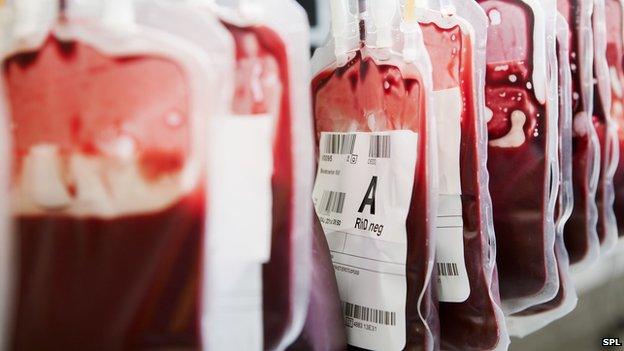Jehovah's Witness 'within rights' to refuse blood transfusion
- Published

A Canadian woman was within her rights to refuse a blood transfusion on religious grounds, a coroner has said.
Eloise Dupuis, 27, died in Quebec in 2016 of multiple organ failure following complications from a Caesarean section.
As a Jehovah's Witness, she repeatedly told hospital staff she did not want to receive a blood transfusion.
She refused treatment even as doctors warned she would die without it. She died nearly a week after giving birth.
Quebec coroner Luc Malouin's released reports this week on two deaths where the patients refused blood transfusions, citing their religious beliefs.
Jehovah's Witnesses believe that the Bible commands that they do not ingest blood, included through transfusion.
Under Quebec's civil code, an adult who is conscious and of sound mind has the right to either accept or refuse medical treatment.
The coroner said hospital staff had no choice but to respect their patients' wishes.
The cases include Ms Dupuis and Mirlande Cadet, a 46-year-old Quebec woman who also died following a Caesarean section. Both passed away within days of each other.
Ms Dupuis' death sparked a debate in the province of Quebec over whether the law should be changed to allow doctors to give emergency treatment under such a circumstance.
In Ms Cadet's case, she eventually received blood after an initial refusal. Her common-law husband authorised the treatment after her parents intervened.
The coroner was unable to determine whether the delay in giving her blood led to her eventual death.
In Ms Dupuis' case, the coroner concluded that the only "medical solution" to help her was a blood transfusion, but that she repeatedly refused the treatment even as she agreed she knew the risks.
Family members also refused to authorise treatment despite repeated attempts by medical staff to convince them to allow the procedure.
"Each person in Quebec has that liberty of choice," Mr Malouin wrote. "This freedom has been exercised in accordance with the rule of law. It is up to everyone to make those choices and to fully assume the consequences."
Mr Malouin also recommended that hospitals have a treatment plan in place to treat patients like Ms Dupuis who refuse blood transfusions.
- Published3 March 2014
- Published17 October 2012
- Published6 May 2014